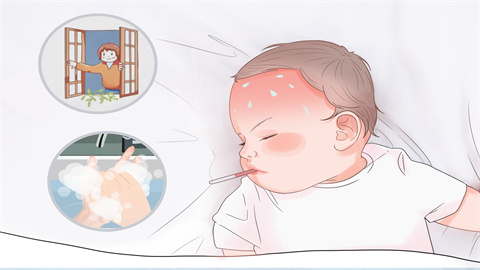What to do if a nine-month-old baby has a low-grade fever
Generally, low-grade fever refers to a mild fever. A nine-month-old baby may experience low-grade fever due to incomplete development of the thermoregulatory center, insufficient water intake, common cold, roseola infantum, urinary tract infection, or other causes. Treatment options, under a physician's guidance, may include general care and medication therapy. Detailed explanations are as follows:

1. Incomplete Development of the Thermoregulatory Center
The thermoregulatory center in nine-month-old infants has not fully matured, making it susceptible to external environmental temperatures and potentially causing temperature fluctuations and mild fever. It is important to maintain a suitable indoor temperature and avoid exposing the baby to excessively cold or hot environments. Adjust the baby's clothing appropriately according to weather changes.
2. Insufficient Water Intake
When a baby lacks adequate hydration, body temperature regulation becomes less effective, which may lead to a low-grade fever. Ensure the baby receives sufficient water intake daily. Increase the frequency of breastfeeding or offer additional water to maintain proper hydration balance.
3. Common Cold
An ordinary cold is usually caused by viral or bacterial infections. Pathogens invade the upper respiratory tract, causing inflammation and possibly resulting in a low-grade fever. Symptoms such as cough and runny nose may also appear. Under medical guidance, medications such as oseltamivir phosphate granules, paracetamol oral solution, and isatis root granules may be used for treatment.
4. Roseola Infantum
Roseola infantum is typically caused by human herpesvirus 6 infection. The viral infection triggers an immune response leading to mild fever, which usually subsides after 3-5 days followed by the appearance of a rash. The baby may also show symptoms such as irritability and reduced appetite. Patients may follow medical advice to use medications such as ribavirin granules, ibuprofen suspension drops, and paracetamol suppositories for treatment.
5. Urinary Tract Infection
Urinary tract infections are commonly caused by bacterial pathogens, such as Escherichia coli, infecting the urinary system. When pathogens multiply within the urinary system, they cause inflammation and may lead to the aforementioned symptoms. Additional symptoms may include frequent urination and urgency. Patients may follow medical recommendations to use medications such as cefuroxime axetil granules, amoxicillin granules, and pidotimod oral solution for treatment.
In daily life, it is important to arrange a balanced diet and appropriate physical activity based on the baby's age and physical condition, avoiding excessive exercise and improper diet that may lead to elevated body temperature.





